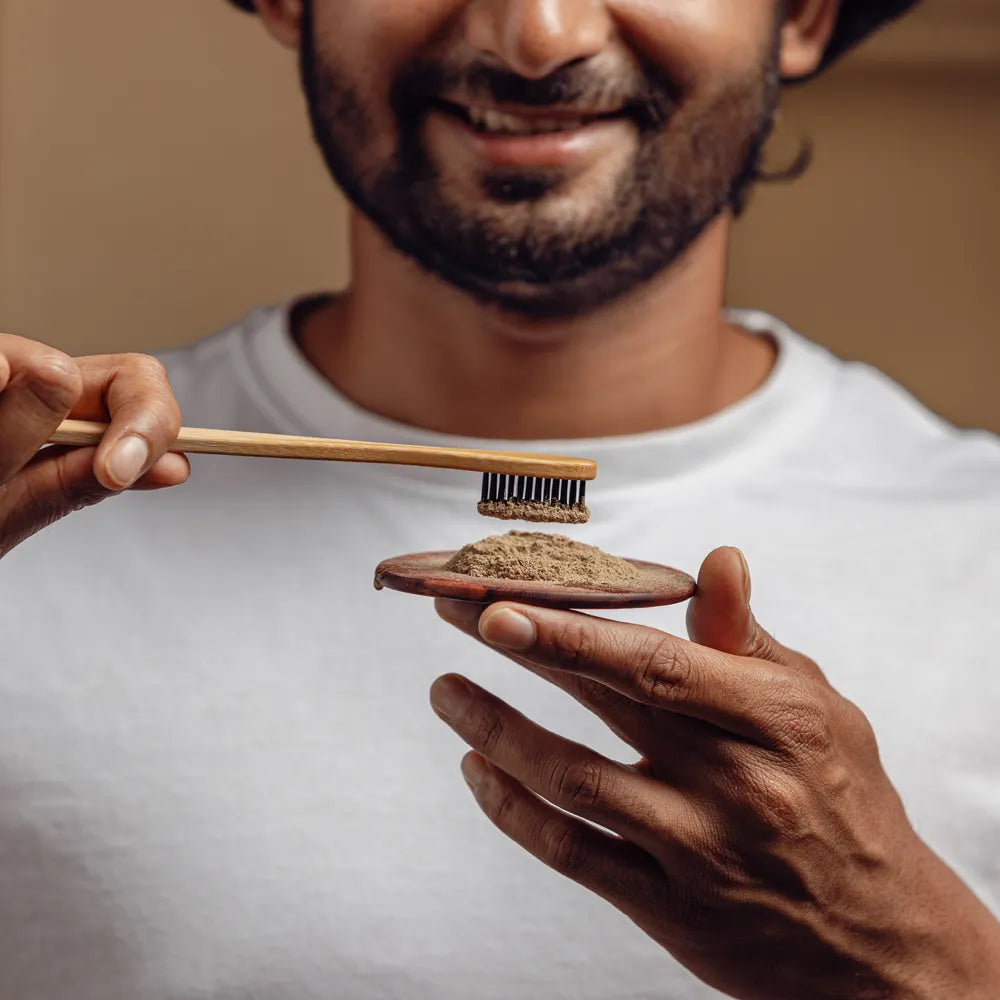For most of us, brushing our teeth with toothpaste is second nature. But in recent years, toothpowder — a more traditional and natural form of oral care — is making a quiet but powerful comeback.
So, what’s the real difference between the two? And more importantly, which one is better for you?
Let’s break it down.
What is Toothpowder, Exactly?
Toothpowder is a dry blend of natural ingredients like clays, herbs, salts, and essential oils, often used for cleaning and polishing teeth. Long before toothpaste tubes became the norm, toothpowder was the go-to for oral hygiene in many cultures.
These days, it’s making a return — and for good reason. With options made from activated charcoal, cardamom, mint, clove, cinnamon, and other plant-based ingredients, it offers a refreshing, minimalist alternative to commercial pastes.
Toothpowder vs Toothpaste: The key differences
|
Feature |
Toothpaste |
Toothpowder |
|
Texture |
Creamy and smooth |
Dry and finely ground |
|
Ingredients |
Often includes foaming agents, artificial flavors, fluoride |
Usually made from clays, herbs, salts, essential oils |
|
Shelf Life |
Can dry out or expire over time |
Longer shelf life; no risk of drying out |
|
Packaging |
Plastic tubes (often non-recyclable) |
Often stored in reusable or recyclable jars |
|
Eco-Friendliness |
Varies widely |
Typically more sustainable |
Why people are Switching to Toothpowder
Here are a few reasons why more people are making the switch:
1. Fewer Chemicals, More Nature
Toothpowders often contain no synthetic foaming agents or preservatives. Ingredients like clove and cinnamon help fight bacteria naturally, while mint and cardamom freshen breath without artificial flavors.
2. Whitening Without the Damage
Charcoal-based powders are a popular pick for their ability to lift stains gently, without the abrasiveness or enamel damage of some whitening pastes.
3. A More Mindful Routine
Using toothpowder with a bamboo toothbrush encourages slower, more intentional brushing. Paired with a bamboo tongue cleaner, it turns an everyday routine into a refreshing ritual.
4. Sustainable and Minimalist
No plastic tubes, no waste. Many toothpowders come in glass or metal containers, and pair beautifully with eco-friendly tools.
Getting Used to Toothpowder: What to Expect?
Toothpowder does take a little getting used to. The dry texture can feel unfamiliar at first, and it doesn’t foam like commercial toothpaste — but that’s not a bad thing. The cleansing still happens, just without the artificial bubbles.
Also, as with any oral care product, it’s important to look for well-formulated powders that are gentle on enamel and safe for long-term use.
So... Which One Should You Choose?
It depends on your lifestyle, preferences, and values.
Choose toothpaste if you:
-
Prefer a creamy texture and foamy feeling
-
Are looking for fluoride-based cavity protection
-
Like the convenience of a ready-to-use product
Choose toothpowder if you:
-
Prefer natural, minimalist formulations
-
Want to reduce plastic waste
-
Enjoy herbal, earthy flavors like clove, cinnamon, or cardamom
-
Want a more travel-friendly and long-lasting option
Pro Tip: Mix and Match!
You don’t have to choose just one. Many people use toothpaste in the morning and toothpowder at night, or alternate depending on their needs. You can also pair your powder with eco-conscious tools like a bamboo toothbrush and a natural tongue cleaner to elevate your entire routine.
Final Thoughts
Toothpowder might seem old-fashioned — but its benefits are refreshingly modern. Whether you’re switching for the planet, your health, or just to simplify your routine, it’s a smart option worth exploring.
At the end of the day, good oral care isn’t about trends. It’s about finding what works for you — and using it with consistency and care.
FAQ's
1. Is toothpowder safe to use every day?
Yes! Most natural toothpowders are gentle enough for daily use. Just be sure to choose a well-balanced formula with non-abrasive ingredients like clays, herbs, and activated charcoal that are kind to enamel.
2. Does toothpowder clean as well as toothpaste?
Absolutely. Toothpowder effectively removes plaque, absorbs toxins, and freshens breath. It might not foam like toothpaste, but it can offer the same (or even better) level of cleanliness when used properly.
3. Can I use a bamboo toothbrush with toothpowder?
Yes — in fact, it's a great combination! A bamboo toothbrush pairs perfectly with powder as its soft bristles help distribute the powder while reducing plastic waste. It’s a simple switch that supports a more sustainable routine.
4. Will charcoal in toothpowder damage my enamel?
Not if it’s finely milled and used in moderation. Activated charcoal can help lift surface stains, but overly gritty powders or aggressive brushing should be avoided. Look for gentle, well-formulated charcoal toothpowders.
5. Can I still use a tongue cleaner if I switch to toothpowder?
Definitely. Using a bamboo tongue cleaner alongside toothpowder enhances your oral hygiene routine by removing bacteria and improving breath. It’s a great holistic approach to cleaner, healthier oral care.


